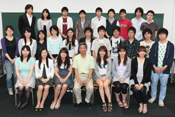Masayuki Tadokoro, Professor, Faculty of Law
Live in the Present with the Past in Mind
Students’ initiative is the bottom line. Third-year students study history of international politics and classics while fourth-year students work on graduation thesis on a subject of each choice.

International politics looks cool and glamorous, where diplomats speaking fluent English conduct conferences and negotiations on hot topics in the spotlight. It is true that different modes and styles of behavior from our daily lives are needed in the international society where a variety of countries with conflicting world views are relating with each other. That is why a special skill like diplomacy has been developed in meeting the needs.
My seminar, however, is designed to give deeper understandings of human and state behaviors rather than dealing with fashionable but ephemeral discourses on hot topics generally popular to students. Many discourses concerning international politics which attracted wide attentions just 10 years ago turned out to be totally irrelevant now. One might think it would be “practical” to just follow trendy discourses, accepting the limits of our cognitive abilities, but I believe that it is worth being intellectually sincerer. Thus, in order to develop students' capability to view the world in deeper ways distancing themselves from whirl of current affairs, the third-year students in my seminar are given assignments mainly on classics and histories. After this process, the fourth-year students start working on their own essays on subjects they choose within a common theme set each year. For example, last year, third-year students were assigned to read works by Thukydides and E.H. Carr whereas energy and international politics was the common theme of essays for the fourth-year students. In addition, during the seminar’s training camp which is held a couple of times a year, I usually set up a scheme which fourth-year students give tests to third-year students, and have discussion over the answers given by students in the hope that this intellectual exercise inspires them.
My seminar is not for gaining skills and knowledge which are useful for certain professions. Actually, graduates go onto various fields such as business, law or civil service; and some even quit their jobs after several years for graduate studies. It is my strong belief that for students who were always expected to give the "right answers" to the questions set by teachers, it is more intellectually worth while to encourage them by asking what the right questions to ask are. There is no single unique “right answer” for many crucial quiestions which students will eventually have to answer in the course of their lives. I am hoping that this seminar is of some help to students at some point in their later lives to face the right questions in the right manners either professionally or personally.
Faculty Profile
Masayuki Tadokoro, Professor, Faculty of Law
Born in Osaka in 1956. Studied at the Graduate School of Kyoto University, and the London School of Economics and Political Science (LSE). Has been Professor of the Faculty of Law at Keio University since 2002 after having taught at the National Defense Academy of Japan. He has authored a number of books including “Amerika” o koeta doru (The Dollar Goes Beyond America).
Student's Voice
Hiroki Matsuda, Fourth-year Student,
Faculty of Business and Commerce
Searching for the Real Intellectual Activity
The seminar of Prof. Tadokoro is not a place to gain knowledge but a space for “intellectual engagement.” Third-year students learn the history of international politics in the 20th century. This year’s fourth-year students write thesis on the theme of the international politics of energy. Prof. Tadokoro never forces a theme or style on us; while he enthusiastically teaches students, he always respects our spontaneous initiatives. In the course of teaching, he never imposes certain answers but always inspires us. For surviving in the complicated today's world, what we need is enduring and versatile intellectual capabilities, instead of superficial knowledge or skills useful for certain purposes. The round-table discussion by both the professor and students in the class is demanding but meaningful “intellectual engagement” that should help us to face many important questions trying to survive this complicated and confusing era, even though we may not be able to come up with instant answers.
*Position titles, etc., are those at the time of publishing.
